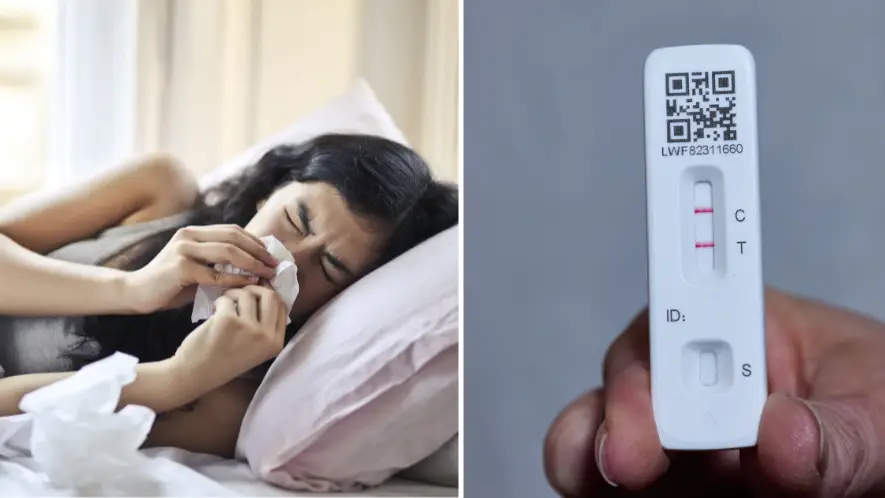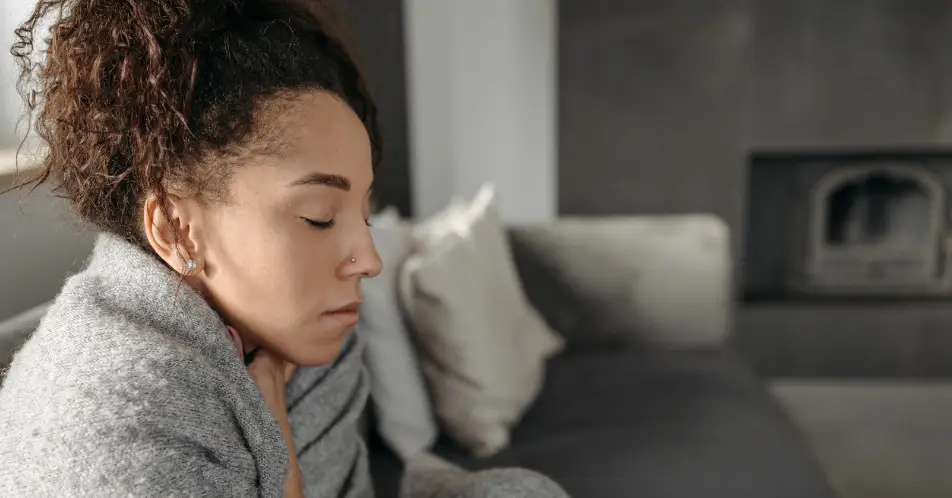
With a new strain of covid-19 on the rise while common cold and flu symptoms quickly spread across the UK, it's easier than ever to get muddled up between the two viruses.
If you've found yourself carrying around a pack of tissues in your pocket to keep track of that runny nose or bed-bound with a pounding headache, the chances are, the thoughts of covid have crossed your mind.
Things got even more confusing this week, when the official list of covid symptoms was expanded by the UK Health Security Agency.

Advert
Along with the well established fever, cough, and loss of smell or taste, the addition of nine new covid symptoms has made it more difficult than ever to decipher between covid and a common cold.
So, the new and improved list of covid symptoms is as follows:
- a high temperature or shivering (chills)
- a new, continuous cough
- a loss or change to your sense of smell or taste
- shortness of breath
- feeling tired or exhausted
- an aching body
- a headache
- a sore throat
- a blocked or runny nose
- loss of appetite
- diarrhoea
- feeling sick or being sick
The exhaustive list of symptoms overlaps quite a bit with the symptoms of both the common cold and the flu.
This can be particularly awkward, especially since free testing for covid from the NHS has ended for most people in England. So what is the difference exactly?

Giulia Guerrini, the lead pharmacist at digital pharmacy www.medino.com, spoke to Tyla about how to decipher between the viruses.
Cold vs Covid
She says: “The respiratory symptoms that appear alongside covid are very similar to those that appear when you contract both the flu and the common cold. Symptoms such as a cough, shortness of breath and difficulty breathing can all appear in all three. Other shared symptoms between the flu and covid include fever, chills, fatigue and muscle pain.
“Although flus, colds and covid all share a range of similar symptoms, they also all have symptoms which are unique to their particular virus. When differentiating between the common cold and covid, if you’re experiencing diarrhoea or nausea (for example), it’s likely that you’ve contracted covid as these aren’t symptoms of the common cold. Also, you’re less likely to feel muscle aches and tiredness with a cold, whereas these are extremely common with covid."
Another factor to consider is the time is exposure time. Giulia told us: "Symptoms of covid will appear within 2 to 14 days after exposure to the virus. However symptoms of the common cold will appear a lot quicker, usually displaying within 1 to 3 days of exposure to the virus."
Flu vs Covid
Common symptoms of both the flu and covid include a cough, aching muscles, tiredness, a sore throat, a runny nose, a fever, diarrhea, nausea, vomiting and a shortness of breath, so it can be a little bit trickier to decipher between these two.
Giulia says: "Symptoms of the flu are also very similar to covid symptoms. However, the main distinguishing difference is that if you have the flu it’s highly unlikely that you’re going to suffer from a loss of taste or smell, one of the most common covid symptoms. "

If you're still not sure whether you have covid, a cold, or a flu, the best course of action is to stay at home and avoid close contact with others - especially those who may be at higher risk.
According to NHS guidance, you can go back to your normal activities once you feel back to normal and your high temperature has gone down.
To get tested for covid and you're not eligible for a free NHS test, you must pay for a test yourself, which you can do from some pharmacies and retailers, in person or online.